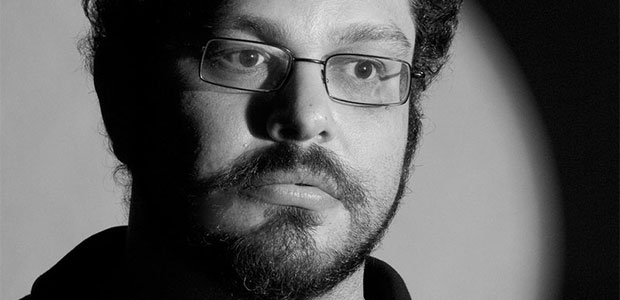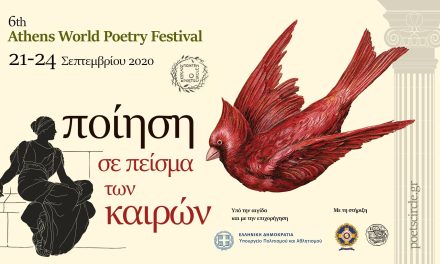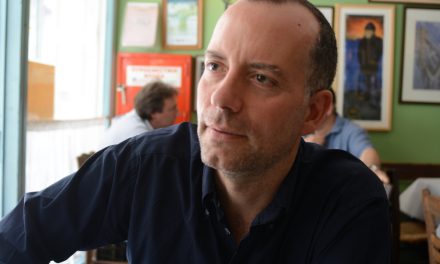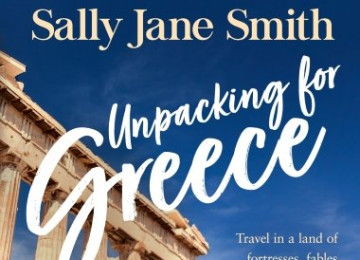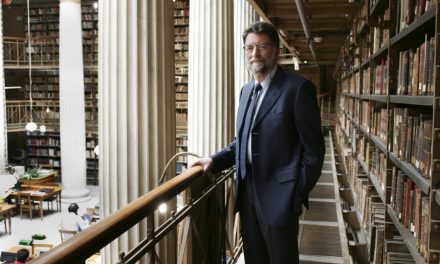Nikos Chryssos was born in 1972 in Athens. He studied at the Department of Biology of the University of Athens and the Department of Direction of the Stavrakos Cinema and Television School. He owns an old books store in Athens. He has written the following novels: Το μυστικό της τελευταίας σελίδας [The secret of the last page] (Kastaniotis Editions, 2009) and Καινούργια μέρα [New Day] (Kastaniotis Editions, 2018). In 2014 he edited and commented the re-published book Αξέχαστοι καιροί [Unforgettable times] by Lefteris Alexiou, as well as the collective volume Ιστορίες βιβλίων [Books stories] (both by Kastaniotis Editions).
Nikos Chryssos spoke to Reading Greece* about his latest novel New Day, which “narrates the adventures of a gang of homeless people who live and die in some port of the European South”. He explains that the book constitutes “an in-depth metaphor of the physical and meta-physical effect of narration, which require the reader’s synergy to be brought to light”, and adds that “the narrations transmute space, while striving to transform time, to extend the moment, and maybe life itself, not in a metaphysical way but by investing in memory which keeps a story alive”.
He comments that “exciting short stories as well as breathtaking multi-faceted novels both constitute the core of our literary tradition” and that “it’s not the form one opts for that matters but rather the way he employs it as well as whether his option was dictated by literary or non-literary criteria”. He concludes that “the first and foremost challenge every writer is faced with is to compose a text that is worth reading” and that in the history of Greek literature “we encounter just a handful of writers who earned their living solely through writhing”. “We remain stubbornly amateurs – that is unrepentant lovers of arts – and difficulties seem to make us more willful rather than discourage us”.
Your latest novel New Day is shortlisted for the European Prize for Literature. Tell us a few things about the book.
The book narrates the adventures of a gang of homeless people who live and die in some port of the European South. When the hero, Sevastianos, is murdered, his four mates, delving into the moments they shared and his narrations, which constitute a priceless heritage, try to revive both his story and theirs in a sequence of episodes which alternate with Sevastianos’ tales.
Pavlos, one of the accomplices, shocked by the brutality of the murder, turns into a mystic and a martyr, the same way the Apostle whose name he bears. He urges the four friends to write down their memories, thus triggering new narrations that never seem to end. New Day tells the story of human adventure, of life and death, of crime and punishment, constituting an in-depth metaphor of the physical and meta-physical effect of narration, which require the reader’s synergy to be brought to light.
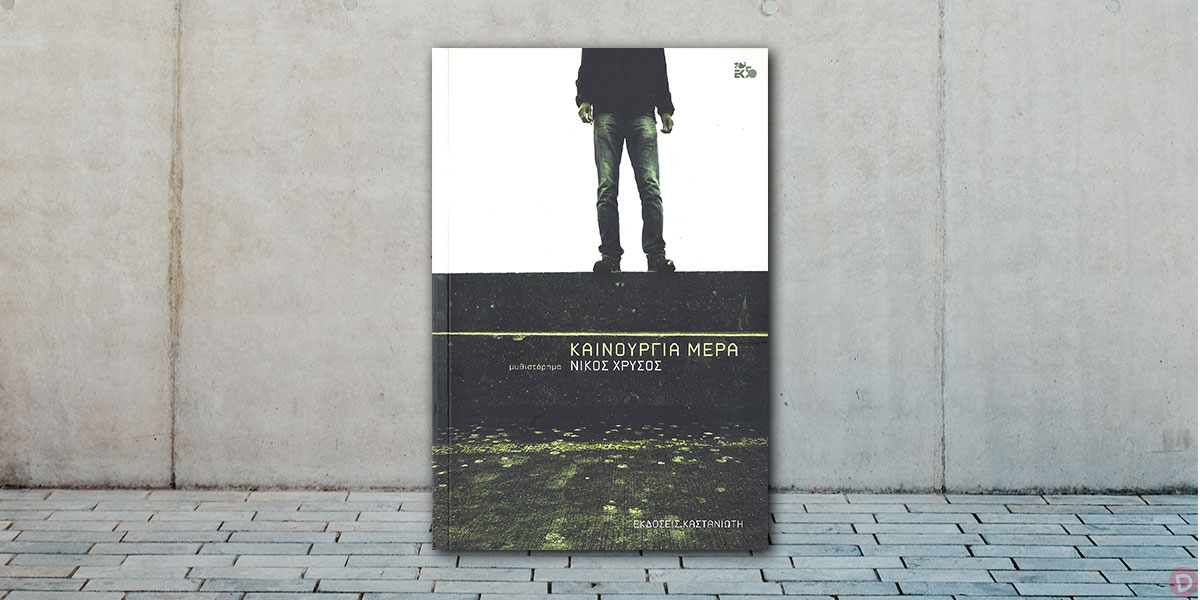
The way narration is structured definitely moves away from traditional norms. What role do time and place serve in your writings?
The topography of the port where the story unfolds is not specified; the Port may remind us of Piraeus, Marseille or Thessaloniki, yet it constitutes an imaginary place, which comprises elements of many Mediterranean ports. As the map of this literary world begins to take shape through the heroes’ narrations, and only through them, with no “objective” testimony whatsoever, one suspects that the port may actually exist, though indiscernible behind the fictional curtain the protagonists-narrators have set; not with the purpose of deceiving the reader but rather guided by the need that urges them to reenact both their life and the life of dead Sevastianos. The narrations transmute space, while striving to transform time, to extend the moment, and maybe life itself, not in a metaphysical way but by investing in memory which keeps a story alive.
The book “tells the story of human adventure, of life and death, of crime and punishment, constituting an in-depth metaphor of the physical and meta-physical effect of narration, which require the reader’s synergy to be brought to light”. Tell us more
The book “borrows” its structure from the New Testament. The narrations of Teos, Markonis, Lucky and Yiannis follow the course of Gospels by Matthew, Mark, Luke and John – while the tales of Sevastianos is a reminder of Jesus Christ’s parables. Heroes do not of course display a dogmatic rigor nor do they promise answers, they just share doubts and questions. Sevastianos shows no messianic skills, nor does he have any kind of dice; yet he is transformed into a charismatic leader through their narrations, which express their deepest desire for existence, solidarity and dignity, conditions which in their eyes appear redemptive.
Despite their haste to recompose the story of his life, it remains unknown – at least in its details – and thus open to innumerable contingencies and interpretations. The homeless protagonists of the book do not aspire to a metaphysical rebirth since they have no religious faith whatsoever, nor do they place their hopes on external forces. Their faith has no metaphysical, but rather a “meta-textual” character given that they discern a transcendental potential in the narrations themselves, as if they were all spectral, transparent and eternal entities, which would have the power to recompose their surrounding fragmented world endowing it with some kind of meaning.
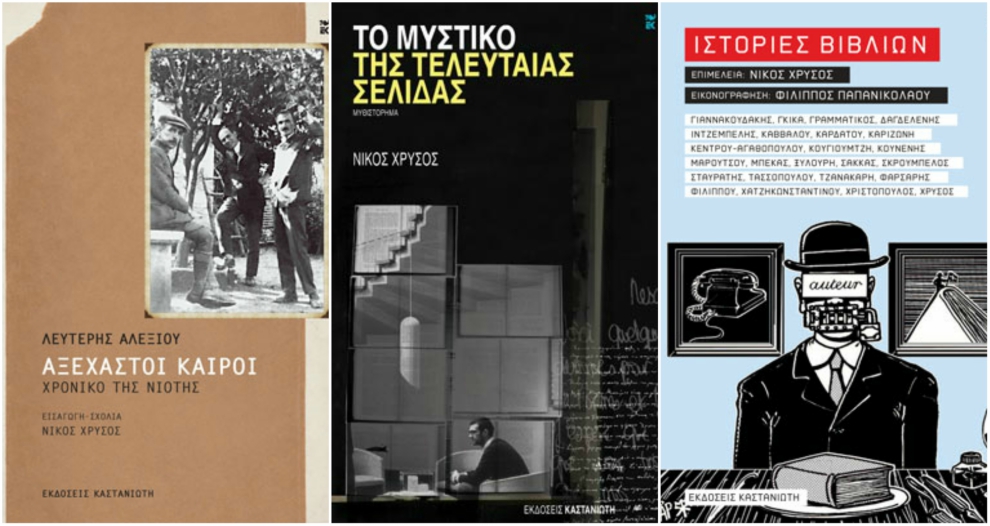
It has been argued that Greek writers have a preference for short form and that short story collections have outweighed novels and longer narratives. How would you comment on this?
Browsing through the history of Greek literature one may encounter major craftsmen of all kinds; exciting short stories as well as breathtaking multi-faceted novels both constitute the core of our literary tradition. It’s not the form one opts for that matters but rather the way he employs it as well as whether his option was dictated by literary or non-literary criteria. I reckon that every story defines its distinct size, form and style, and the writer is obliged, having elaborated on his narrative tools, language, sense of rhythm and analytical ability, to show the same diligence whether he depicts the impression of an impeding moment or represents a multi-dimensional world.
Which are the main challenges new writers face nowadays in order to have their work published? What role do the social media play in the promotion of new literary voices?
The first and foremost challenge every writer is faced with is to compose a text that is worth reading. Of course, you need both effort and luck to have your book printed and showcased in bookstores; yet the book itself is what matters the most. Despite a decade of economic distress, hundreds of titles are published every year and your book may be among them. We often put the blame for our failure on others, that is prejudiced publishers, “literary networking” or to the denigration of our literary value without examining whether, during the writing process, we have employed all our powers and skills in order to attain a worth reading result.
The social media constitute valuable communication and advertising tools. Yet, in no way do they dictate reading trends, with the exception of small groups, nor do they depict a truthful image of reality. I stand critically towards them; I may use them but I don’t invest more time in them, nor do I pay more attention to them than they are worth.
For the majority of Greek writers, writing is not a main profession but rather a leisure time activity. Would you agree that in a country stricken by the crisis, earning a living through writing is the exception rather than the rule? Could things be otherwise?
If we have a look at the history of Greek literature of the last one hundred years, we encounter just a handful of writers who earned their living solely through writing. The long standing economic crisis has further aggravated the situation, without however creating a novel condition; we remain stubbornly amateurs – that is unrepentant lovers of arts – and difficulties seem to make us more willful rather than discourage us. Reaching a larger audience constitutes every writer’s wishful thinking and in case it is fulfilled, things could be completely different. Thank you.
*Ιnterview by Athina Rossoglou
TAGS: LITERATURE & BOOKS | READING GREECE

